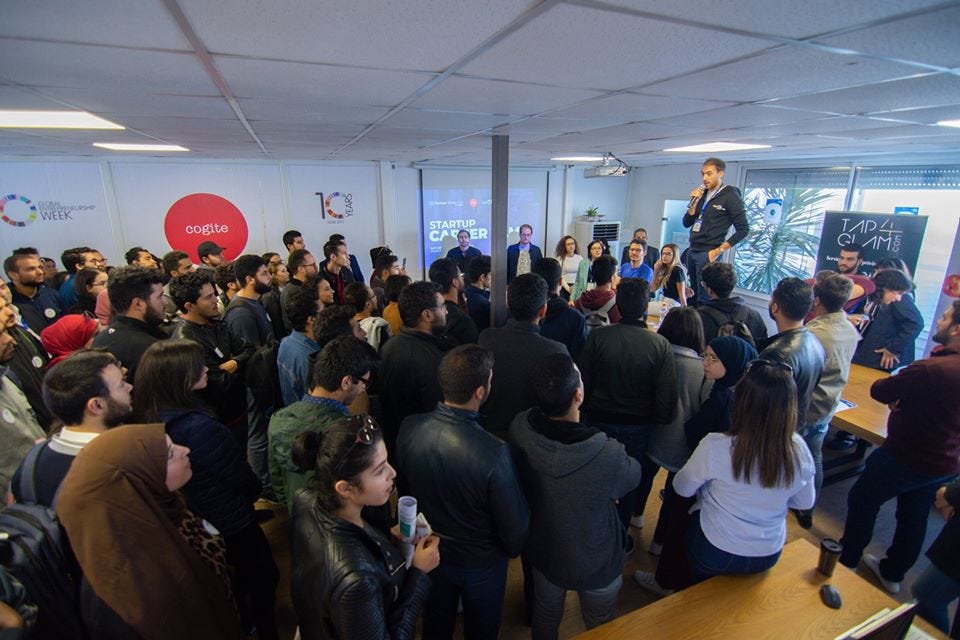In order to create a more dynamic startup ecosystem that fosters innovation and encourages entrepreneurs to venture into unknown lands, governments, corporations, and policymakers must understand the benefits of employing new policies and passing new laws that supports the geeks behind each innovation.
While governments across the MENA region have been allocating funds and initiating programs to support early-stage startups, there is little to be seen when it comes to enacting standardised laws that maximize the entrepreneurs’ chances to success.

“New policies and regulations should take into account the challenges faced by entrepreneurs and the needs of the ecosystem. The timing of the Startup Act couldn’t be better as it stimulates and encourages entrepreneurship across the country. Ultimately, it will result in thousands of new jobs created, important advances in technology and national economic growth.” — Yehia Houry, Flat6Labs Tunis’ Managing Director
Tunisia is one of those countries with its eyes set on empowering its startup ecosystem, and allocating the necessary resources for its hungry and passion-driven entrepreneurs.
“The Startup Tunisia initiative is meant to put the country on the map of startup-friendly ecosystems, sustained by three main pillars: the Tunisian Startup Act; the 200m Euro Fund of Funds; and the ecosystem support. With these things in motion, a synergy effect is expected to be produced between three key players: Investors, as the growth engine; incubators/accelerators as the performance lifter; and Startups as the economic and innovative locomotive.” — Haythem Mehouachi, General Manager of Smart Capital, Startup Tunisia operator.
Through Tunisia’s latest Startup Act, it hopes to create a fertile ground for innovation that both encourages competition and propels individuals who seek to utilise their solutions to the benefit of the community in many industries through its pre-set criteria (as quoted from the Tunisian Startup Act).
– Its legal existence does not exceed eight (08) years from the date of its constitution
– Its human resources, its total balance sheet and its annual turnover do not exceed the ceilings set by government decree
– More than two-thirds (2/3) of its capital is held by natural persons, venture capital investment companies, and collective investment funds. investment, seed money and any other investment body according to the legislation in force or by foreign Startups
– Its business model is highly innovative, utilizing cutting-edge technology
– Its activity has strong potential for economic growth.
This criteria set ensures that only the innovative, competitive, and ambitious startups get the Tunisian “Startup” label, and according to Salma Baghdadi, Smart Capital’s Startup Ecosystem Manager, 210 startups have earned it; out of which were 20+ Flat6Labs startups like, Dabchy, Tap4Glam, Sqoin, Junior Robotics Lab, Grabingo, Chantier, Logis, Trust It & many more.

Ali Mnif, the Country Manager of Silatech in Tunisia and a member of the ‘Collège des Startups’ and one of the pioneers that worked on the project since the beginning said:
“Clearly, the best thing that could happen is a Startup Act 2.0. All the learnings, the mistakes, the feedback will better shape the second iteration of the key measures to be included.
Startup act 1.0 is a breath of fresh air for many entrepreneurs, startups and investors. It is also a powerful wave that reached many other countries. We keep hearing good news mainly in Africa.
In any iteration, the startup act is capable of breeding more mature startups with solid teams, who are backed up by experienced investors. The challenge would be to quickly incubate, accelerate and support the next regional champions.”
This act should be employed or adapted by other governments because:
1) Promotes Unmatched Innovation of Young & Hungry Entrepreneurs

One of the main criteria of getting the startup label is to be utilising a highly innovative business model, and to use cutting edge technology as part of the solution you are offering, be it a service or a product.
2) Releases Entrepreneurs From The Shackles of Failure
Aspiring entrepreneurs are often burdened with the fear of failure, and it seems to shackle most startup ecosystems around the world, with the first thought being losing the main job that earns them a living, the sustained expenses that come with establishing a startup, and more. Tunisia’s Startup Act allows them to maintain the contract they have with their previous employer without the benefits and grants them a “Startup Leave.” This allows them to focus solely on their startup, and gives them a safety net to fall on if it so happens that the startup fails. It also allows for free local and sometimes international intellectual property registration for startups, and exempts them from corporate taxes.
3) More Innovation Means More Competition

While the day to day consumer or business is often limited by the choices of big corporates, and public services that might be either too outdated or lacks quality, startups pave the road for unmatched innovation at often reasonable prices. More startups usually means more competition, and more competition means better products and services for the community at lower prices.
4) Proves that Innovation Is Often Synonymous With Solving Current Problems
Younger generations think daily of their problems, and many have innovative solutions to the problems at the back of their heads. Utilising this power is instrumental to helping governments resolve the country’s problems. When these entrepreneurs innovate, they solve a problem.
5) More startups means more job opportunities.

Instead of depending on large and medium-sized corporations and governments to do the hiring, startups can offer fresh graduates a new path of learning that is both beneficial and more challenging with often better pay if the startup happens to succeed.
These factors help sustain economic growth and prosperity for the country and the startup ecosystem. They breed a nation driven by sustained innovation in every corner and every industry.

